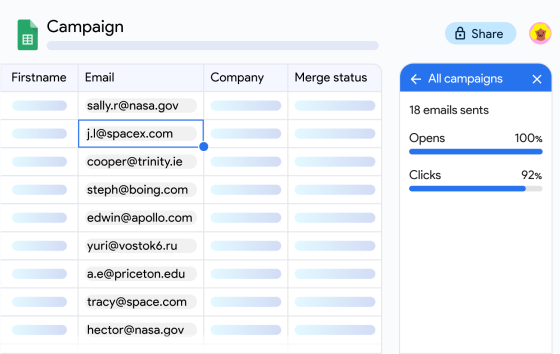Vocus.io focuses primarily on mass personalized mail-merge campaigns and email tracking. It packs a punch with its tracking capabilities as it lets you use your own domain name for link-tracking.
However, Vocus.io’s limited features might leave you wanting more. Maybe the interface feels clunky? or the costs do not match the benefits? Regardless of your reasons, finding a good alternative can be tough. That is why we have scoured the market to bring you some of the finest alternatives to Vocus.io.
Here’s our list of 5 Saleshandy alternatives:
Let’s go through them,
Mailmeteor
First up is our fav: Mailmeteor,
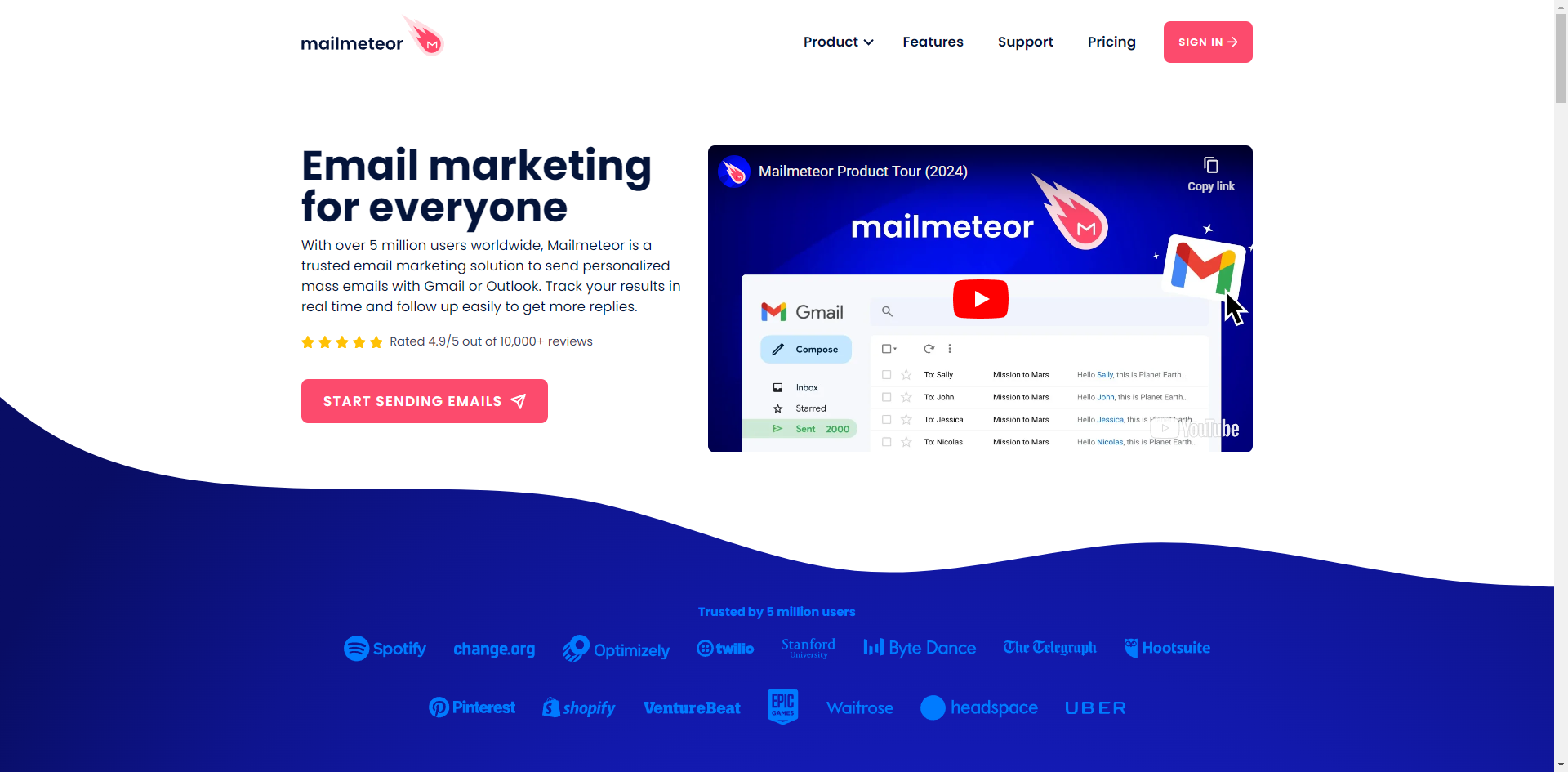
Mailmeteor is a user-friendly mail merge extension that seamlessly integrates itself with your Google Workspace account and dramatically improves your email campaigns. If you need an alternative to Vocus.io that excels at improving your cold outreach efforts, Mailmeteor is the obvious choice. By adding a personal flair to your emails, you ensure that each recipient feels special and catered to. Combine this with Mailmeteor’s powerful automation features such as email scheduling, auto follow-ups, and email sequences, you can sit back and relax after the initial campaign as Mailmeteor automatically reaches out to recipients who did not respond or open the email.
Whether you are a small business, freelancer, or simply someone looking for a job, Mailmeteor is one of the best ways to boost your success rate with minimal investment.
Pros of Mailmeteor
- Easy to Use: Mailmeteor fits decently within your existing Gmail interface, making it one of the simplest email marketing tools to learn and master.
- Automation: With features like email scheduling, automated follow-ups, and email sequences, Mailmeteor boosts your productivity with minimal effort as you can set up your ideal workflow once and forget about it.
- Personalized Campaigns: Mailmeteor lets you send personalized emails in bulk, Mention recipients by name to boost engagement and response rates, use a customized salutation for each recipient, and use a different subject line for each prospect.
- Microsoft Excel Integration: If you prefer managing your recipients and analytics through Microsoft Excel, Mailmeteor offers an easy-to-use Excel plugin that you can use to send your emails.
Cons of Mailmeteor
- Email Cap: Since Mailmeteor uses your Gmail account, Google-imposed sending limits apply. For example, business accounts can send up to 2,000 emails per day.
Mailmeteor Pricing
Mailmeteor offers a free tier with no time limits. This basic plan lets you send 50 emails per day from your Gmail or Google Workspace account. It is perfect for small businesses needing a quick mail merge solution for their email campaigns.
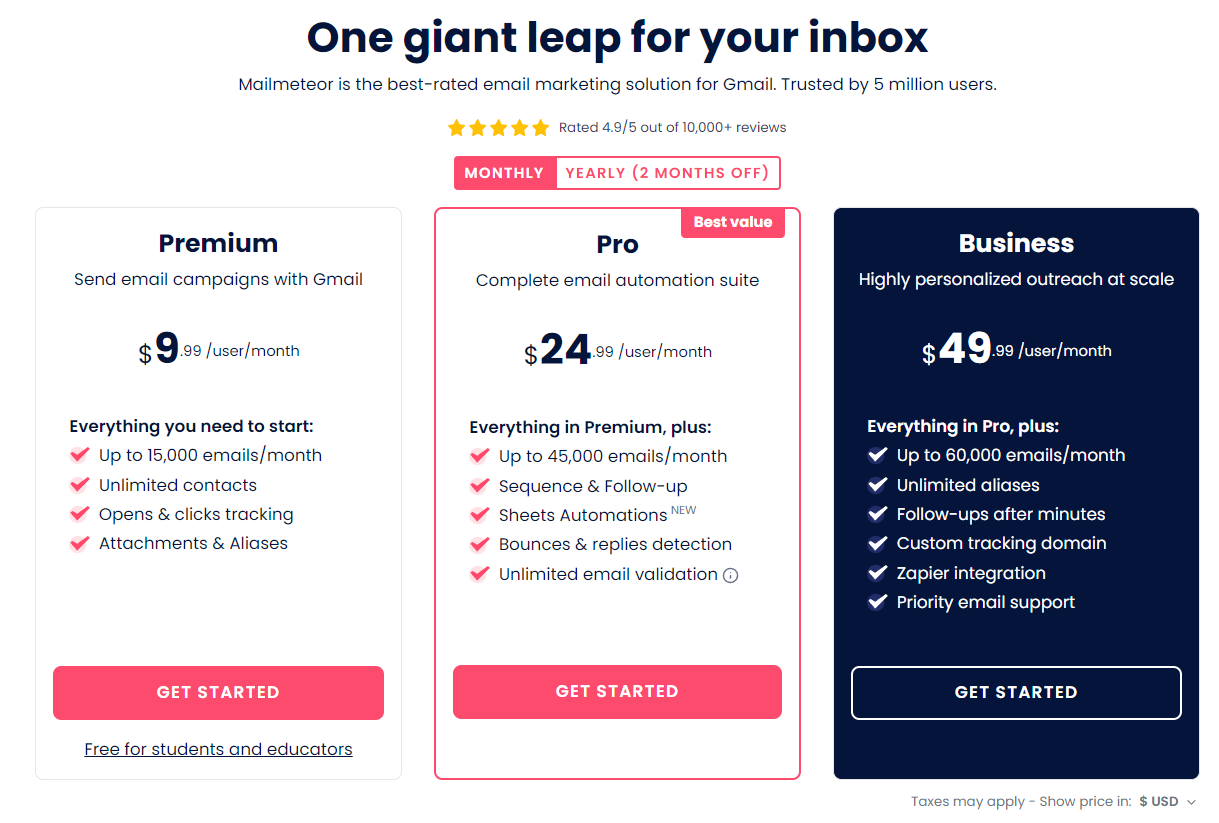
Mailmeteor Starter
Starting at just $4.99 per user, per month, the Starter plan allows you to send 250 emails per day.
Mailmeteor Premium
From $9.99 per user per month, Premium includes 500 emails/day and get access to advanced features such as attachments, alias, tracking as well. This tier does not include advanced automation features.
Mailmeteor Pro
Priced at $24.99 per user, per month, the Pro plan offers a complete email automation suite and includes everything in the premium plan. It is an excellent choice for businesses looking to optimize their email marketing efforts and save on labour.
- You can send up to 1,500 emails per day.
- Email sequences
- Auto Follow-up features
- Bounces and reply-rate analytics.
Mailmeteor Business
The Business plan, priced at $49.99 per user, per month, the business plan is for highly personalized outreach at scale and includes everything from the Pro plan for businesses that need a reliable email marketing solution.
- You can send up to 2,000 emails per day.
- Instant Follow-up support
- Custom tracking domains for click-detection.
- Zapier integration
- Priority support.
Mailbutler
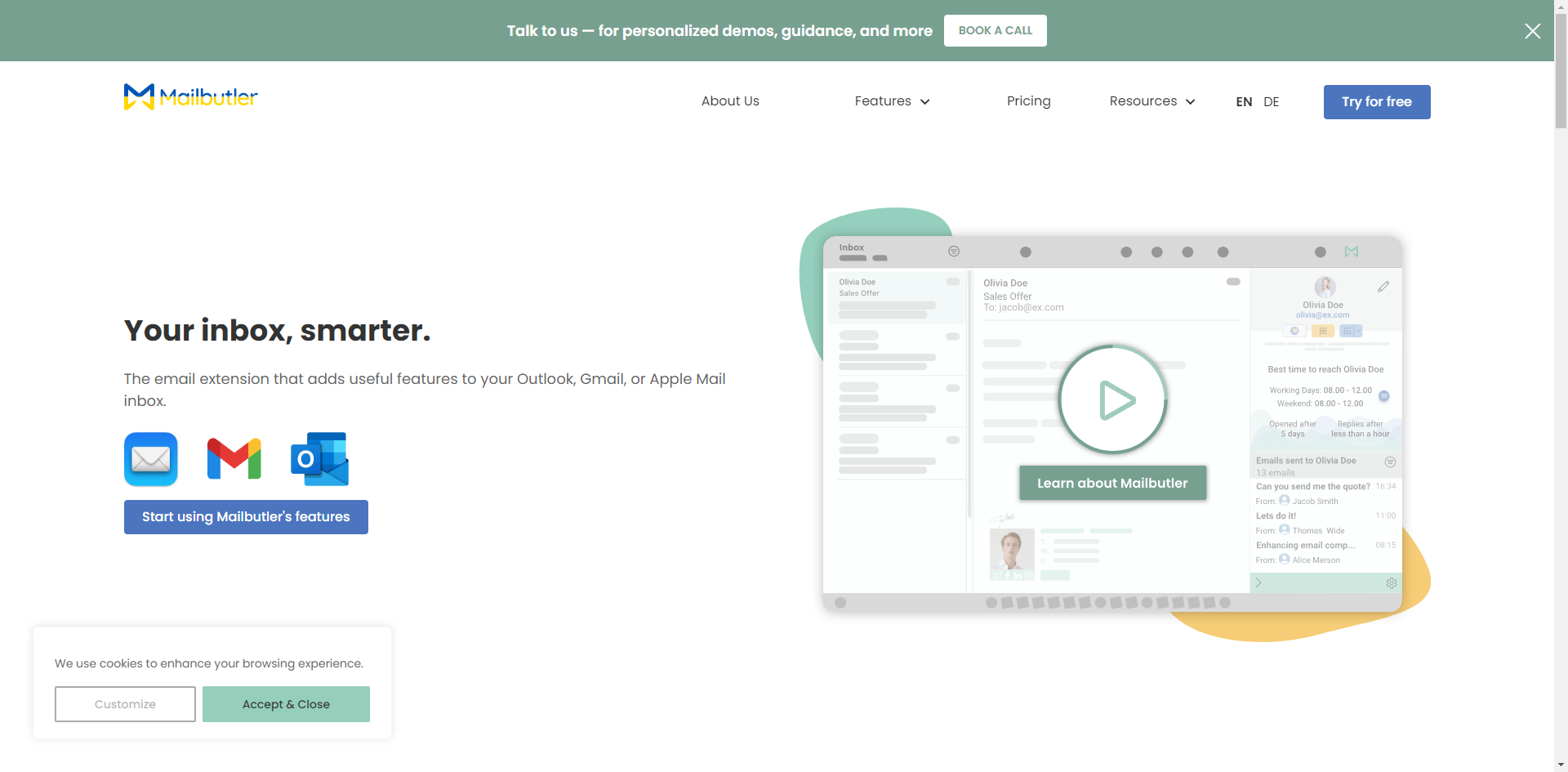 Mailbutler is a productivity-focused email extension that adds functionality to your email inbox regardless of whether you use Outlook, Gmail, or Apple Mail. It offers tools like email tracking, templates, tasks, custom notes, and a smart assistant to improve your email management. The Smart Assistant helps you compose drafts quickly, summarizes emails for you, and suggests improvements.
Mailbutler is a productivity-focused email extension that adds functionality to your email inbox regardless of whether you use Outlook, Gmail, or Apple Mail. It offers tools like email tracking, templates, tasks, custom notes, and a smart assistant to improve your email management. The Smart Assistant helps you compose drafts quickly, summarizes emails for you, and suggests improvements.
However, it falls short in bulk email personalization, as it lacks mail merge capabilities and essential email marketing tools for solopreneurs. If you are looking for a tool that solely improves your email workflow and do not care about Vocus.io’s personalized emailing capabilities, Mailbutler is the ideal alternative for you.
Pros of Mailbutler
- Email Provider Support: Mailbutler works with Outlook, Gmail, and Apple Mail, making it a versatile tool for any email client. It will be difficult to find another productivity extension that supports multiple email service providers.
- Productivity Focus: Mailbutler improves your email workflow with features like tracking, task lists, email tags, and email templates. These help you manage your emails more efficiently and focus on the things that matter.
- Smart Assistant: The Smart Assistant helps you write emails faster by suggesting improvements and summarizing content, ensuring that your messages are clear and get the point across without any misunderstandings.
Cons of Mailbutler
- Lack of Mail Merge: There is no doubt that the productivity tools which Mailbutler offers are unmatched in value, but you cannot use the email templates to send emails in bulk. You are better off using a proper mail merge tool for that part of the job.
Mailbutler Pricing
Mailbutler offers a range of pricing plans to suit diverse needs, starting from basic email tracking to professional business solutions.
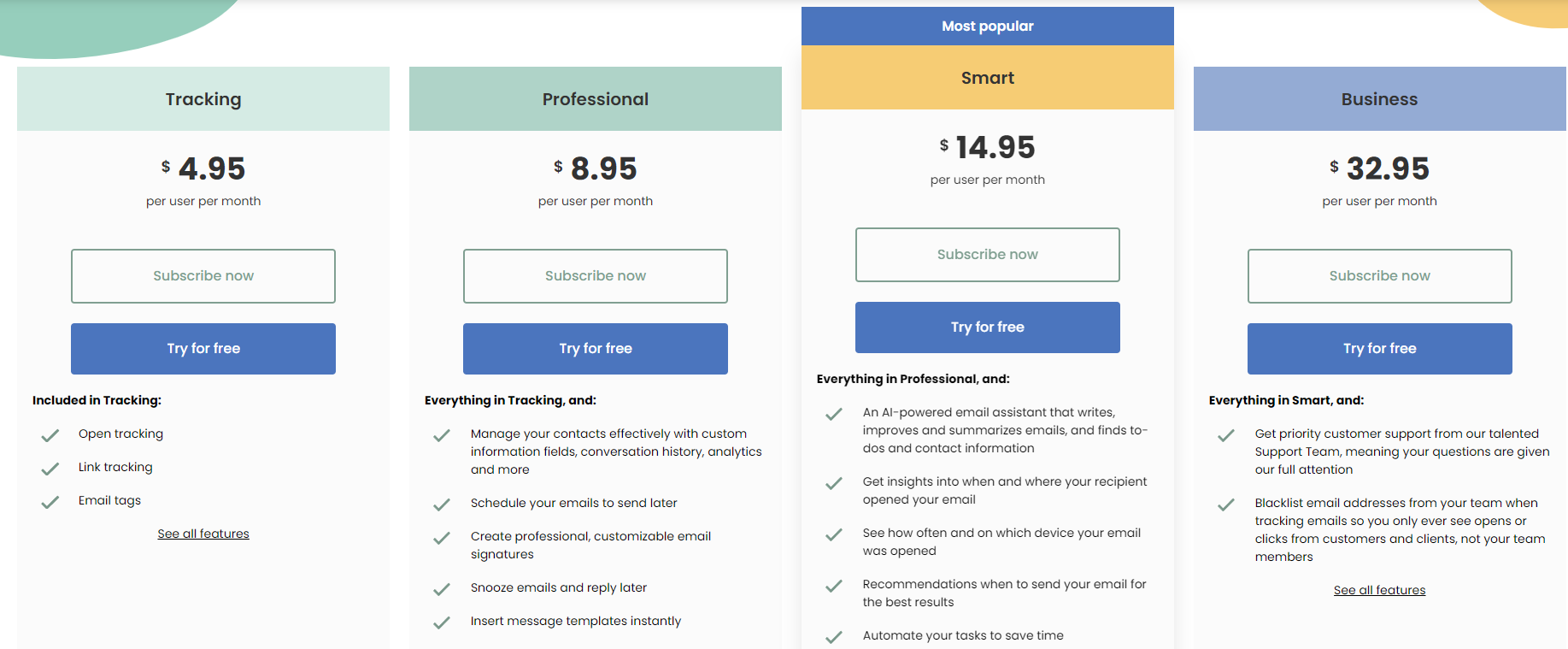 Their four tiers are:
Their four tiers are:
- Tracking ($4.95/user/month): Includes open tracking, link tracking, and email tags.
- Professional ($8.95/user/month): Offers all Tracking features, plus email scheduling, customizable signatures, email snoozing, and instant message templates.
- Smart ($14.95/user/month): Includes all Professional features, AI-powered email assistant, opening insights, device tracking, usage recommendations, and task automation.
- Business ($32.95/user/month): Provides all Smart features along with priority customer support and the option to blacklist email addresses within your team.
Gmelius

Gmelius is an excellent alternative to Vocus.io as it transforms Gmail into a collaborative workspace, offering features like shared inboxes, email automation, and process streamlining. Trusted by over 10,000 teams, Gmelius allows your team to share inboxes, Google Groups, aliases, and labels. Their AI-powered automation helps simplify email workflows, from drafting and sending emails to summarizing long threads, Gmelius does it all.
Pros of Gmelius
- App Integrations: Gmelius integrates seamlessly with many third-party applications, letting users build a more optimized and efficient workflow.
- Collaboration-Focused: Take team collaboration to a whole new level with Gmelius. Features like shared inboxes have always been heavily requested by Google Workspace users, Gmelius took it upon themselves to make it happen.
- Email Automation: Gmelius has all the automation features you can ask for, whether it be email scheduling, outreach automation, or email sequences, Gmelius has it all.
Cons of Gmelius
- Complex for New Users: Plenty of users will find Gmelius to be overly complex, requiring a certain level of technical expertise to set up and manage workflows effectively.
Gmelius Pricing
Gmelius offers three pricing tiers designed to cater to various business needs: Lite, Growth, and Pro. Each plan comes with a set of features aimed at improving your business’ email collaboration and automation capabilities, providing flexibility depending on the size and requirements of your team.
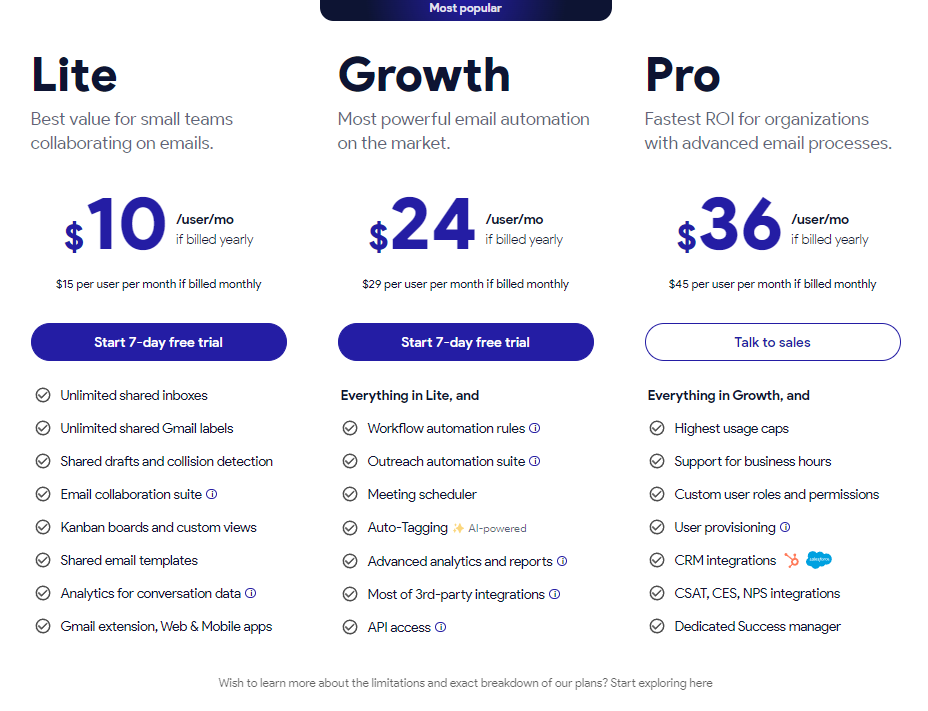
- Lite ($15/user/month): Ideal for small teams, offering unlimited shared inboxes and Gmail labels.
- Growth ($29/user/month): Includes all Lite features plus workflow automation rules and advanced analytics.
- Pro ($45/user/month): Provides everything in Growth with higher usage caps and CRM integrations for larger organizations.
Lemlist
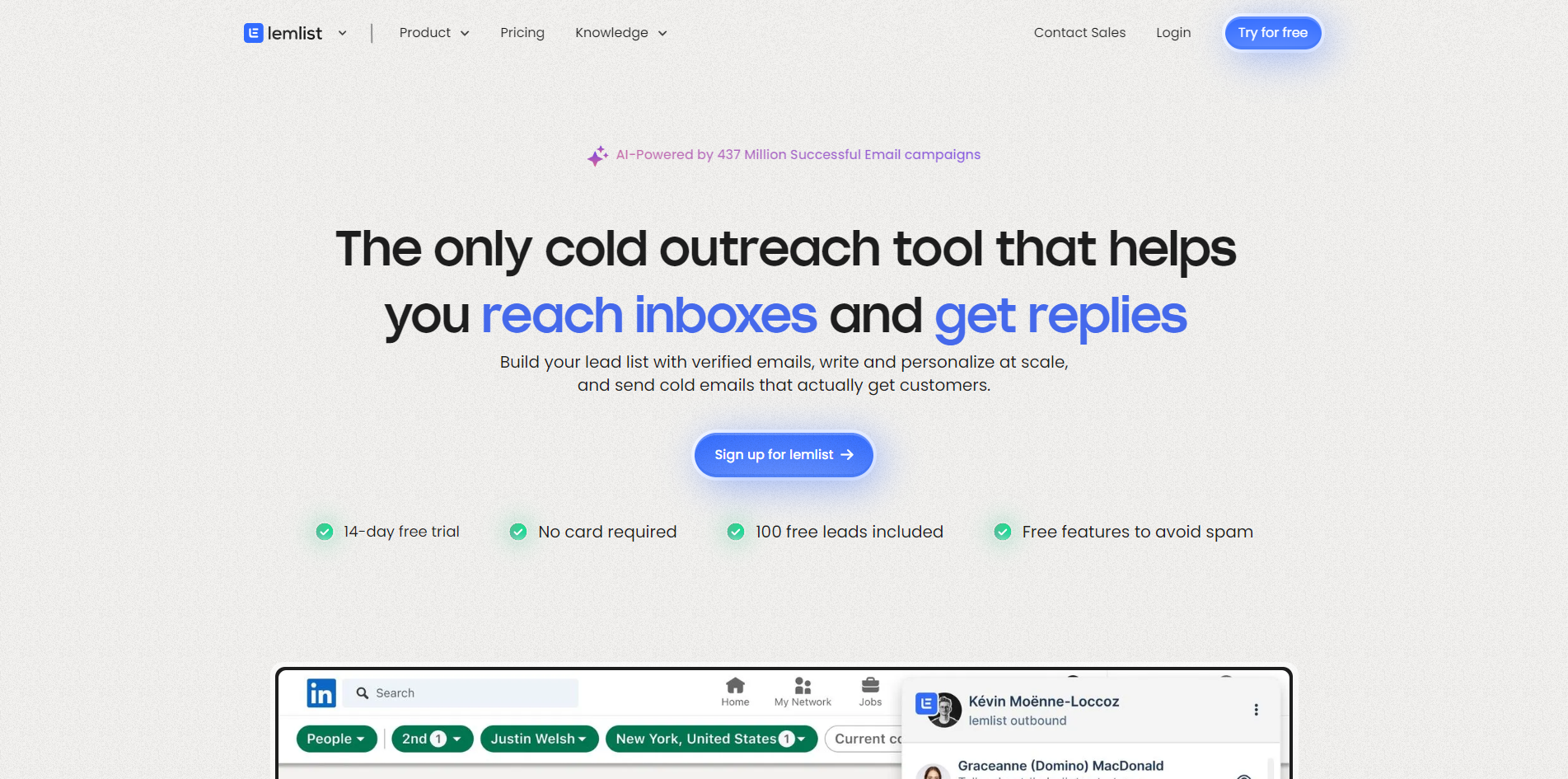 If you are looking for an alternative to Vocus.io for your cold outreach needs, Lemlist offers many compelling features that might catch your eye. Lemlist goes beyond simple mail-merge with its powerful lead-finding tools such as the email finder, ensuring your messages land where they should. It also stands out with advanced personalization options, allowing you to include custom images, landing pages, and even videos in your emails.
If you are looking for an alternative to Vocus.io for your cold outreach needs, Lemlist offers many compelling features that might catch your eye. Lemlist goes beyond simple mail-merge with its powerful lead-finding tools such as the email finder, ensuring your messages land where they should. It also stands out with advanced personalization options, allowing you to include custom images, landing pages, and even videos in your emails.
Pros of Lemlist
- Email Finder: Lemlist automatically finds and verifies emails for you, minimizing bounce rates and improving your lead generation.
- Multi-Channel Automation: By letting you follow up through SMS or LinkedIn if someone does not reply, Lemlist lets you hold the higher ground against competitors who only focus on email.
- Personalization: Lemlist offers personalization options beyond texts and links. You can add custom images, landing pages, and videos to your emails.
- Email Marketing Platform: You will find all essential email marketing tools on a single platform. Lemlist caters to all your needs, from finding leads to sending highly personalized follow-ups and automating your email workflows.
Cons of Lemlist
- High Price Point: Lemlist packs powerful features, but it comes at a high price. This can be a hurdle for new freelancers or small businesses on a tight budget.
- Additional Email Finder Credits: Running out of email finder credits on Lemlist means you will have to pay extra. This additional cost can quickly add up and strain your budget.
Lemlist Pricing
There is no doubt that Lemlist is one of the more expensive tools on the market, but it does carry its own weight when pitched against other email marketing platforms. Each tier caters to different levels of business needs. Ranging from basic email campaigns to advanced multi-channel outreach, but the costs can add up quickly.
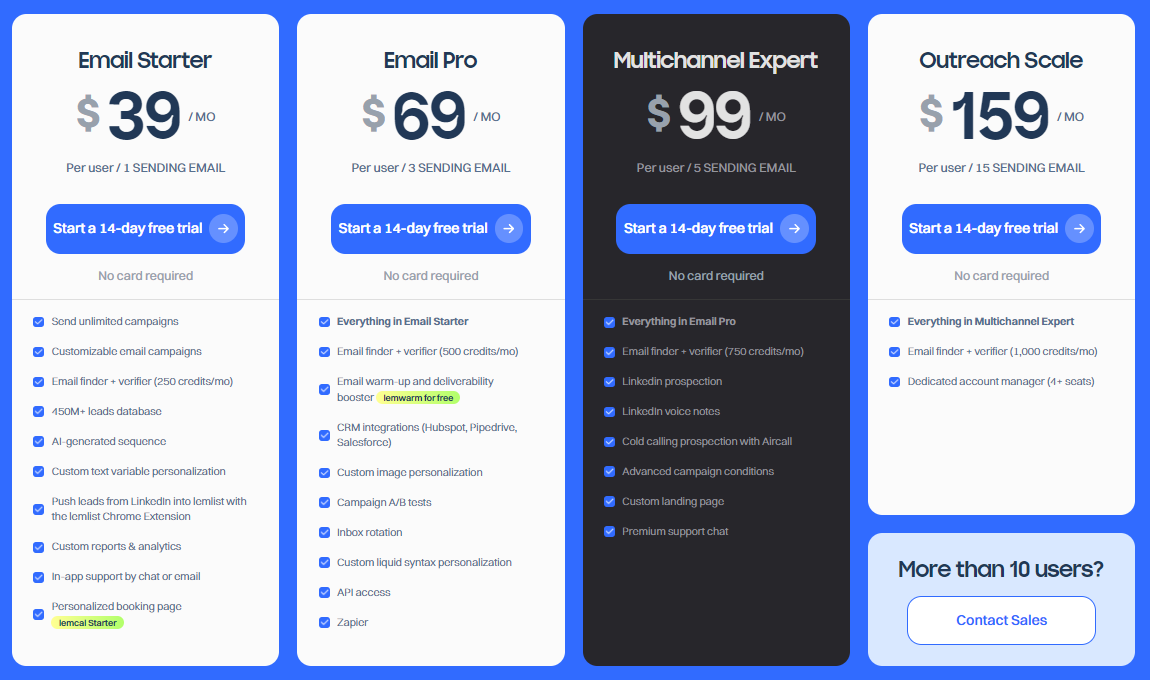
- Email Starter ($39/user/month): Perfect for business who simply need to make use of Lemlist’s unlimited campaigns and basic personalization.
- Email Pro ($69/user/month): Adds email warm-up, CRM integrations, and advanced personalization.
- Multichannel Expert ($99/user/month): Includes LinkedIn prospecting, cold calling, and premium support.
- Outreach Scale ($159/user/month): Designed for large teams who need dedicated account managers and extensive email finder credits.
QuickMail
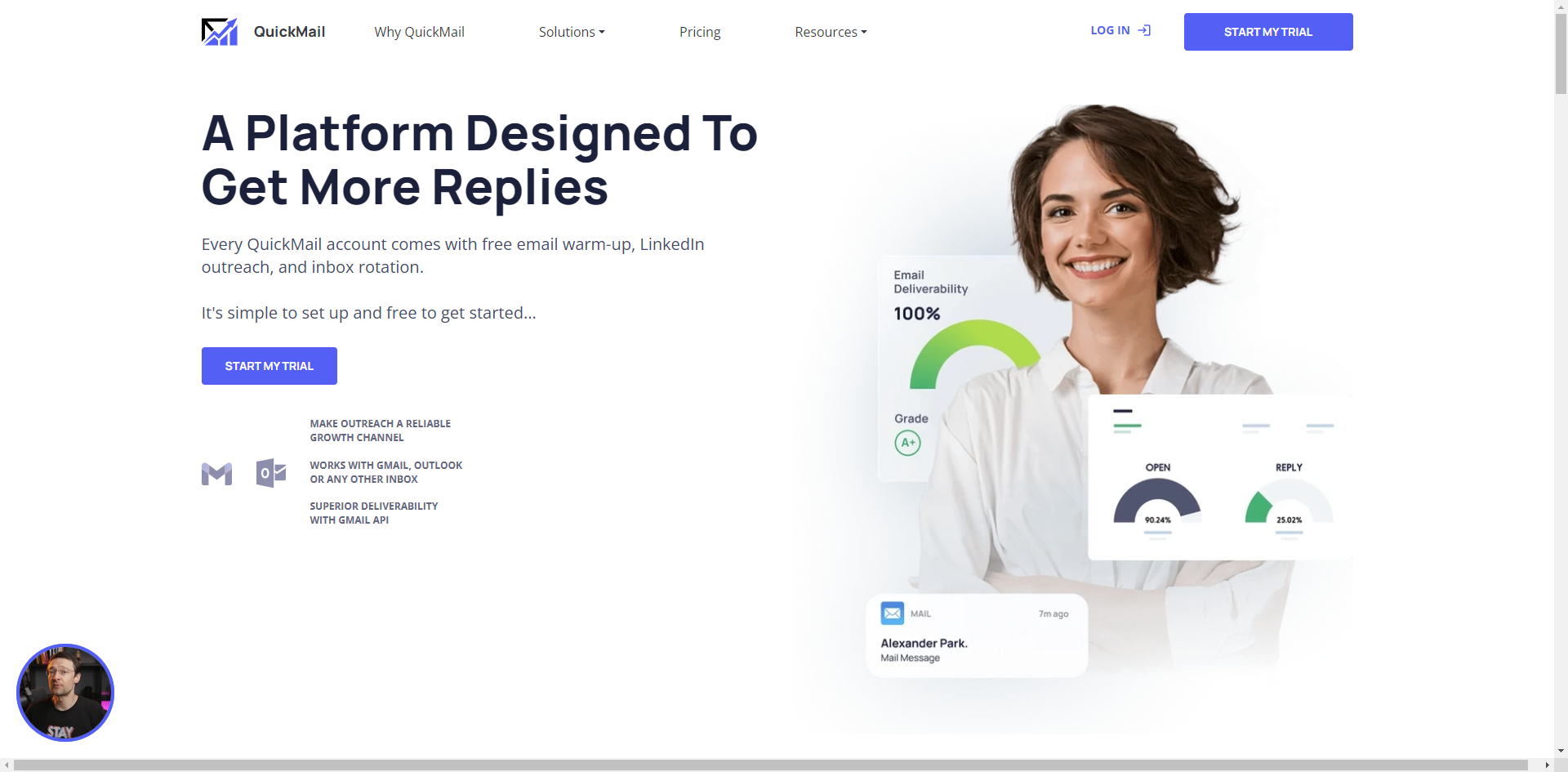 QuickMail is a decent alternative for those who need an email outreach solution that works with mailboxes other than just Gmail. Designed to maximize reply-rates without doubling your effort, QuickMail offers a host of features that make cold emailing a breeze. These features include a free email warm-up tool, LinkedIn Outreach, and inbox rotation, ensuring that your emails land in the recipient’s inbox and not the spam folder. Its superior deliverability makes it a perfect fit for users of Gmail, Outlook, or any other email service.
QuickMail is a decent alternative for those who need an email outreach solution that works with mailboxes other than just Gmail. Designed to maximize reply-rates without doubling your effort, QuickMail offers a host of features that make cold emailing a breeze. These features include a free email warm-up tool, LinkedIn Outreach, and inbox rotation, ensuring that your emails land in the recipient’s inbox and not the spam folder. Its superior deliverability makes it a perfect fit for users of Gmail, Outlook, or any other email service.
Pros of QuickMail
- Free Email Warm-up: Every QuickMail comes with free email warm-up, boosting your deliverability and ensuring your emails land in the recipient’s inbox.
- Inbox Rotation: This feature lets you send emails from multiple inboxes, increasing your sending volume without compromising deliverability.
- Advanced Automation: From prospect import to follow-ups and email verification, QuickMail automates tedious tasks, saving you valuable time.
- Unlimited Team Members: QuickMail is one of the few services out there that let you have as many user accounts as you want without any additional costs.
Cons of QuickMail
- Limited Customization: Some users might find the customization options for email templates lacking & difficult to use, compared to more advanced email marketing platforms.
- Dependency on External Tools: To get the most out of QuickMail, integration with other tools like CRMs or Zapier might be necessary, which can add complexity & costs.
QuickMail Pricing
QuickMail offers competitive pricing with three distinct plans tailored for various business needs, empowering you with the ability to engage prospects automatically, leverage powerful analytics, and utilize advanced email marketing features.

- Basic Plan ($49/month): With an upper limit of 30,000 emails per month, support for 5 email addresses, and 1 LinkedIn account, most businesses will be more than happy with this tier.
- Pro Plan ($89/ month): Scale up to 100,000 emails monthly with 20 email addresses and various CRM integration.
- Expert Plan ($129/ month): Send up to 300,000 emails monthly with 50 email addresses and enjoy advanced analytics and AI features that further improve your productivity.
Choosing a Winner
Picking the best alternative to Vocus.io depends on your specific needs. Each of the alternatives we have explored above offer unique strengths, from Mailmeteor’s simplicity and automation features to Lemlist’s advanced personalization and QuickMail’s broad compatibility.
Here is a quick rundown to help you decide which one fits you best:
- Mailmeteor: Best for businesses and individuals seeking an easy, Gmail-integrated solution with powerful automation and personalization features. Has a free-tier and paid plans start at $9.99 per user/month.
- Mailbutler: Perfect for professionals looking to boost email productivity across multiple email clients. The lack of a mail-merge & mass personalization tool is made-up by its other standout features, starting at $4.95 per user/month.
- Gmelius: Best for teams who need a collaborative workspace within the Google ecosystem. Gmelius offers comprehensive email automation and shared inbox features, although the complete solution is a bit pricey.
- Lemlist: Suitable for those desiring advanced cold outreach capabilities including unique personalization options. Pricing starts at $39 per user/month.
- QuickMail: A robust choice for users who need an outreach solution compatible with multiple email services, featuring advanced automation and excellent deliverability. Costs begin at $49 per month, with no limit on the number of users you can have.


